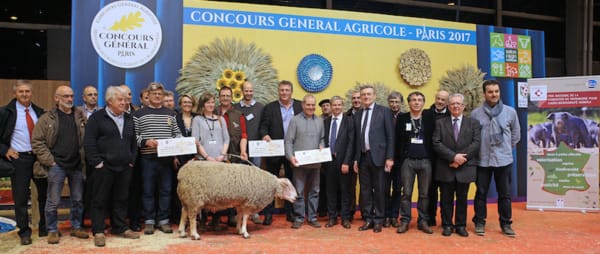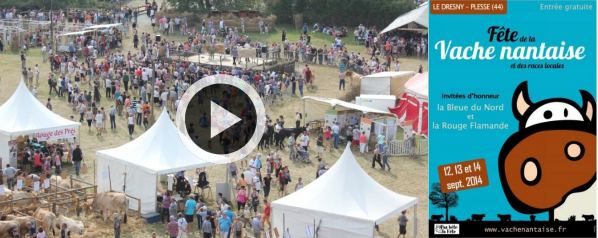On 2 March, at the Paris International Agricultural Show, the Fondation du Patrimoine and Ceva Santé Animale awarded the “Fondation du Patrimoine National Animal Agro-Biodiversity Prize” to 3associations committed to preserving regional livestock breeds: Sasi Ardi Sheep from the Pyrenees (1st prize), Moka Cattle from Reunion Island (2nd) and Boulonnais Sheep from the north of France (3rd).
At this 5th edition, the judging panel decided to award an exceptional Grand Prix d’Honneur to the Pas Bête la Fête Association, the organizers of the Nantaise Cattle and Local Breeds Festival, to encourage their efforts in the protection, awareness and promotion of local breeds that are present only in small numbers.
Co-founded in 2012 by the Fondation du Patrimoine and Ceva Santé Animale, under the patronage of the French Ministry of Agriculture, the “Fondation du Patrimoine National Animal Agro-Biodiversity Prize” is awarded in recognition of original actions to preserve and promote French rare breeds that represent a unique genetic heritage: cattle, goats, horses, sheep, pigs, poultry, working dogs and other farm animals.
In 5 years, this competition has uncovered more than 170 initiatives all over the country and has rewarded 16 prize winners, giving new impetus to their personal and professional projects. As in previous years, the judging panel particularly appreciated the variety, richness and quality of the applications it reviewed.
The endowment for this 5th edition was exceptionally high at€45,000 to mark this anniversary year. The decisions made by the judging panel were based on three major criteria: the project’s economic dimension, its social and environmental impact in the given territory, and the steps to increase public awareness and communication around a rare breed.
A key commitment confirmed in an alarming report by the FAO1
Almost 1,500 livestock breeds are currently endangered around the world (17%) and almost 100 species of livestock disappeared between 2000 and 2014. Europe is one of the regions around the world with the highest proportion of endangered breeds.
“It is our duty to support all forms of agriculture. While we need sustainable intensive agriculture to feed a growing population (800 million inhabitants still do not have enough to eat), traditional agriculture is also essential to preserve our planet’s biodiversity and conserve our genetic heritage. It is this genetic wealth that constitutes the most efficient protection of our ecosystem in the face of climate change and emerging diseases. In addition, these traditional forms of agriculture allow the preservation of our economic and social fabric and ultimately our cultural identity.”
Dr. Marc Prikazsky, Chairman & CEO, Ceva Santé Animale
GRAND PRIX D’HONNEUR: NANTAISE CATTLE AND LOCAL BREEDS FESTIVAL (LOIRE-ATLANTIQUE)
Project Leader: “Pas Bête la Fête” Association Le Clos, Le Dresny – 44630 Plesse
Chairman: Laurent Chalet
Endowment: €25,000
This year, the judging panel decided to award an exceptional Grand Prix d’Honneur to the Pas Bête la Fête Association for its original and audacious action in support of local breeds. Their initiative corresponds to the general objectives of the prize, consisting in promoting and developing local breeds that exist only in small numbers. This event was originally organized around the Nantes cattle breed, before becoming the “Festival of Local Breeds”.
This unique event takes place every 4 years (8th edition scheduled for September 2018) and is a genuine success (45,000 visitors and 1,300 volunteers in 2014).
This prize will enable the creation of a Local Breeds Centre to raise awareness of virtuous husbandry practices and the place of local breeds in small-scale farming.
1st PRIZE: THE SASI ARDI SHEEP (PYRÉNÉES-ATLANTIQUES)
Project leader: Sasi Artalde Association – Mairie de Sare – 64310 Sare
Chairman: Jean Lassalle
Endowment: €10,000
Unknown outside of the region, the Sasi Ardi breed has now been included in the registry of the Ministry for Agriculture which officially recognizes the different French breeds. It is rustic and therefore particularly suited to the brush areas in the medium altitude mountains of the Basque Country. It is also characterized by two typical meat products – 5-month-old lamb and the 28-month-old male – whose delicious meat is greatly appreciated locally.
The judging panel were won over by the economic project based on providing technical support to breeders and promoting the two typical products that should ensure the development of the Sasi Ardi.
2nd PRIZE: MOKA CATTLE (REUNION)
Project leader: Association for the Promotion of the Heritage and Ecology of Reunion
(APPER) – 79 Rue Petite Plaine, Plaine des Grègues – 9780 Saint-Joseph
Chairman: Max Fontaine
Endowment: €6,000
The fruit of a complex history made up of multiple influences that have shaped their originality, Moka cattle are a breed with a mix of qualities specific to Reunion Island. It has recently been registered in the official breed catalogue of the Ministry for Agriculture. The conservation and promotion of the Moka breed is a common cause among farmers, naturalists and scientists. The main actions of the association focused on the encouragement of new breeders and promoting the direct or indirect products of the Moka breed among local consumers and farmers. The judging panel hoped to encourage this great international initiative to establish a plan to conserve this breed that is at risk of disappearing.
3rd PRIZE: THE BOULONNAIS SHEEP BREED (NORTH)
Project leader: Regional Center for Genetic Resources, Nord-Pas-de-Calais
Le Héron Farm, Chemin de la Ferme Lenglet – 59650 Villeneuve-d’Ascq
Project officer: Florent Piedanna
Endowment: €4,000
The Boulonnais sheep is a very old breed from the Channel and North Sea coast, which nearly disappeared in the 1980s. Its rusticity and walking abilities make this breed suitable for the new eco-grazing systems that are fast developing in protected areas along the coast. In addition, the quality of Boulonnais lamb is largely appreciated locally and its reputation is growing. The judging panel were sensitive to the dynamism of the candidate along with the seriousness of project that is well integrated into its local environment.
A look back at previous winners
2016 PRIZE
1st prize | Association of producers of the Red Turkey of the Ardennes(€10,000) | Ardennes |
|---|---|---|
2nd prize | Adrian Rigal, breeder of Raïole Sheep (€6,000) | Aveyron |
3rd prize | Seine Normande Regional Nature park for the conservation of theDuclair Duck (€4,000) | Seine-Maritime |
2015 PRIZE
1st prize | Gilles Delas, breeder ofBéarn Cattles(€10,000) | Pyrénées-Atlantiques |
|---|---|---|
2nd prize | National Conservation Association of theGasconPig (€6,000) | Pyrénées-Atlantiques |
3rd prize | Conservatory of Aquitaine Breeds for the Landes Pony(€4,000) | Gironde |
2014 PRIZE
1st prize | Matthieu Pires, breeder of Avranches Sheep, Milgoulle Farm (€10,000) | Ille-et-Vilaine |
|---|---|---|
2nd prize | Association for the Conservation and Promotion of the Les FossésGoat | Ille-et-Vilaine |
3rd prize | Conservation and Breeders Association of the Brigasca Sheep (€4,000) | Alpes-Maritimes |
2013 PRIZE
1st prize | The French Club for theBerry Black Hen(€6,000) | Indre |
|---|---|---|
2nd prize | Théophane Rochette, breeder ofMaraîchine Cattle, Grole Bagnade Farm (€3,000) | Charente |
3rd prize | Conservation Association of the Crau Sheep Dog (€1,000) | Bouches-du-Rhône |
Copyright-free photos (copyright indicated in the file names):
https://drive.google.com/drive/folders/0By_u-iKfinNnQnp6Q1pxNTMwUlU?usp=sharing
Press pack 2017:
1 FAO (Food and Agriculture Organization of the United Nations) – Report on the State of the World's Animal Genetic Resources – 27 January 2016

 Corporate Website
Corporate Website
 Africa
Africa
 Argentina
Argentina
 Asia
Asia
 Australia
Australia
 Belgium
Belgium
 Brazil
Brazil
 Bulgaria
Bulgaria
 Canada (EN)
Canada (EN)
 Chile
Chile
 China
China
 Colombia
Colombia
 Denmark
Denmark
 Egypt
Egypt
 France
France
 Germany
Germany
 Greece
Greece
 Hungary
Hungary
 Indonesia
Indonesia
 Italia
Italia
 India
India
 Japan
Japan
 Korea
Korea
 Malaysia
Malaysia
 Mexico
Mexico
 Middle East
Middle East
 Netherlands
Netherlands
 Peru
Peru
 Philippines
Philippines
 Poland
Poland
 Portugal
Portugal
 Romania
Romania
 Russia
Russia
 South Africa
South Africa
 Spain
Spain
 Sweden
Sweden
 Thailand
Thailand
 Tunisia
Tunisia
 Turkey
Turkey
 Ukraine
Ukraine
 United Kingdom
United Kingdom
 USA
USA
 Vietnam
Vietnam


